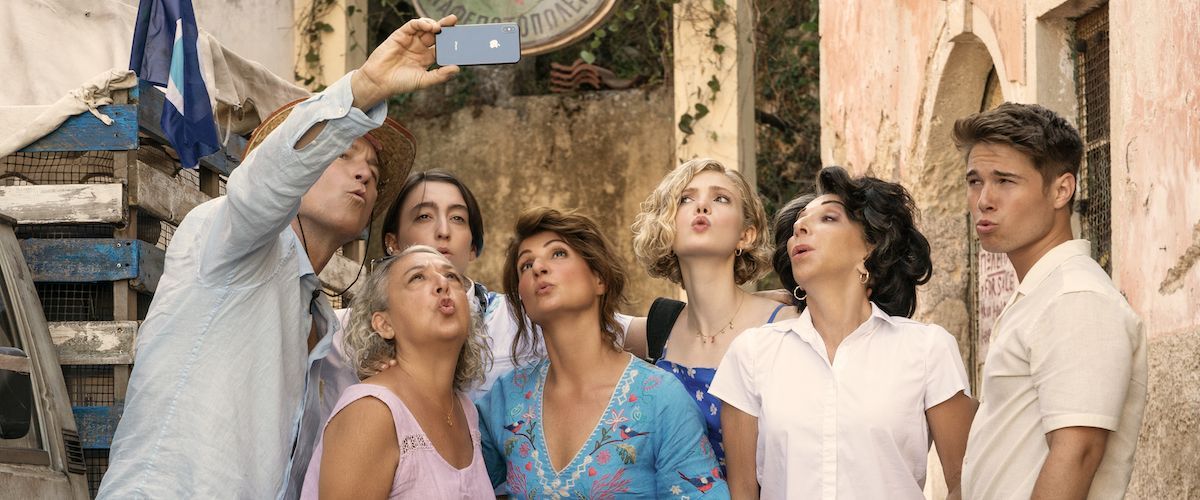Jonah Naplan October 7, 2023
I laughed once during “My Big Fat Greek Wedding 3,” at a joke so preposterously silly I couldn’t contain my chuckle. It’s the type of counterintuitive sight gag we envision going a certain way, and then are shocked when the movie breaks our expectations and actually does a version of that very same thing. But those ten seconds are the one and only time I laughed, and the movie never offers anything nearly as funny again.
“My Big Fat Greek Wedding 3,” the unwanted follow-up to the appropriately disdained “My Big Fat Greek Wedding 2” from 2016, does feature a wedding located in Greece, but not one that’s especially big or fat. It may be a stretch, but for the sake of complaining, “my” is not an apt adjective either, as the film is narrated by Toula Portokalos (played by Nia Vardalos, who also wrote, directed, and produced the movie), and the wedding is not her own (why would it be?) or that of her daughter’s; it’s the gámos of two barely developed young Greeks making their premiere appearance in the franchise who are both native to the small village in which the movie takes place.
Michael Constantine played the beloved Portokalos patriarch Gus in the other two Fat Weddings, but passed away in 2021, leaving Vardalos a vital hole to fill in this suspected franchise closer. In honor of his memory, the Portokalos clan travels to Greece, each for the very first time, to reunite with his childhood friends in the family’s small, ancestral village he grew up in. The movie dedicates much exertion to making sure that each family member is affixed with only a single personality trait—one that is either irrefutably Greek or universally vile or both—and doesn’t give the majority of its characters much to do.
Toula remains the reliable backbone, asserting just enough dominance to make it clear she’s the star of the show, but not so much that she reaches unlikeable territory, while her husband Ian (John Corbett), the “not Greek” one, is subjected to being her loyal sidekick, and often the voice of reason in the movie’s messier scenarios. Their daughter Paris (Elena Kampouris) is given perhaps the most to work with among this crowded ensemble, as she rekindles lost love with her college sweetheart, the dashing Aristotle (Elias Kacavas), a young man who happens to be along for the ride for reasons never fully understood.
Nick (Louis Mandylor), Toula’s brother, is defined only by shaving his body parts at inappropriate times and pointing out when something is a “Greek word” or of Grecian origin, and the beloved matriarch Maria (Lainie Kazan) is stuck at home denying what is clearly the inception of Alzheimer’s. Most of the film’s emotional ties draw from the inevitable: Toula and Nick stand around facing gorgeous views, mourning the loss of their father, wondering if their mother will be next, and how soon. The sudden cuts from dancing and singing, happy and joyful, to somber and gloomy are off-putting, and we sometimes can’t tell which side a certain scene belongs to.
It’s not as if it matters anyway, because both the humor and the emotions are undercut by the free-sailing notion most romantic comedies of the 2000s have cited in enough detail to write an instructional manual on how to make one. In “My Big Fat Greek Wedding 3,” the dramatic stakes are at a low, and the urge to entertain is at a high. But the movie gets so excited about the concept of traveling to such a desolate destination and portraying the rural life of the less fortunate population that it forgets to actually do anything once it arrives. I could not tell you the names of the two people that get married (at least without checking IMDb), nor could I give you an explanation as to how Angelo and Nikki Portokalos (Joey Fatone and Gia Carides, respectively) end up, inevitably, bringing home Gus’s old friends.
Screenwriting manuals suggest that a script should at the very least have a protagonist and a conflict, but while this film has a protagonist—many of them—there’s barely any bumps in the road, a minor conundrum, or a tussle between characters. Issues are resolved before we realize they were ever even there, and the wit corroborates so starkly that it dissipates from memory as it’s occurring. Picture an electrocardiogram that is always flatlined, a bottle of soda that has lost its carbonation, or whatever the opposite of the San Francisco suburbs is. That’s the level of narrative breadth “My Big Fat Greek Wedding 3” is nearly always performing, and not in any new or innovative way either. After all, nothing can compare to the shock of a shepherd whipping out an iPad.
Now playing in theaters.

